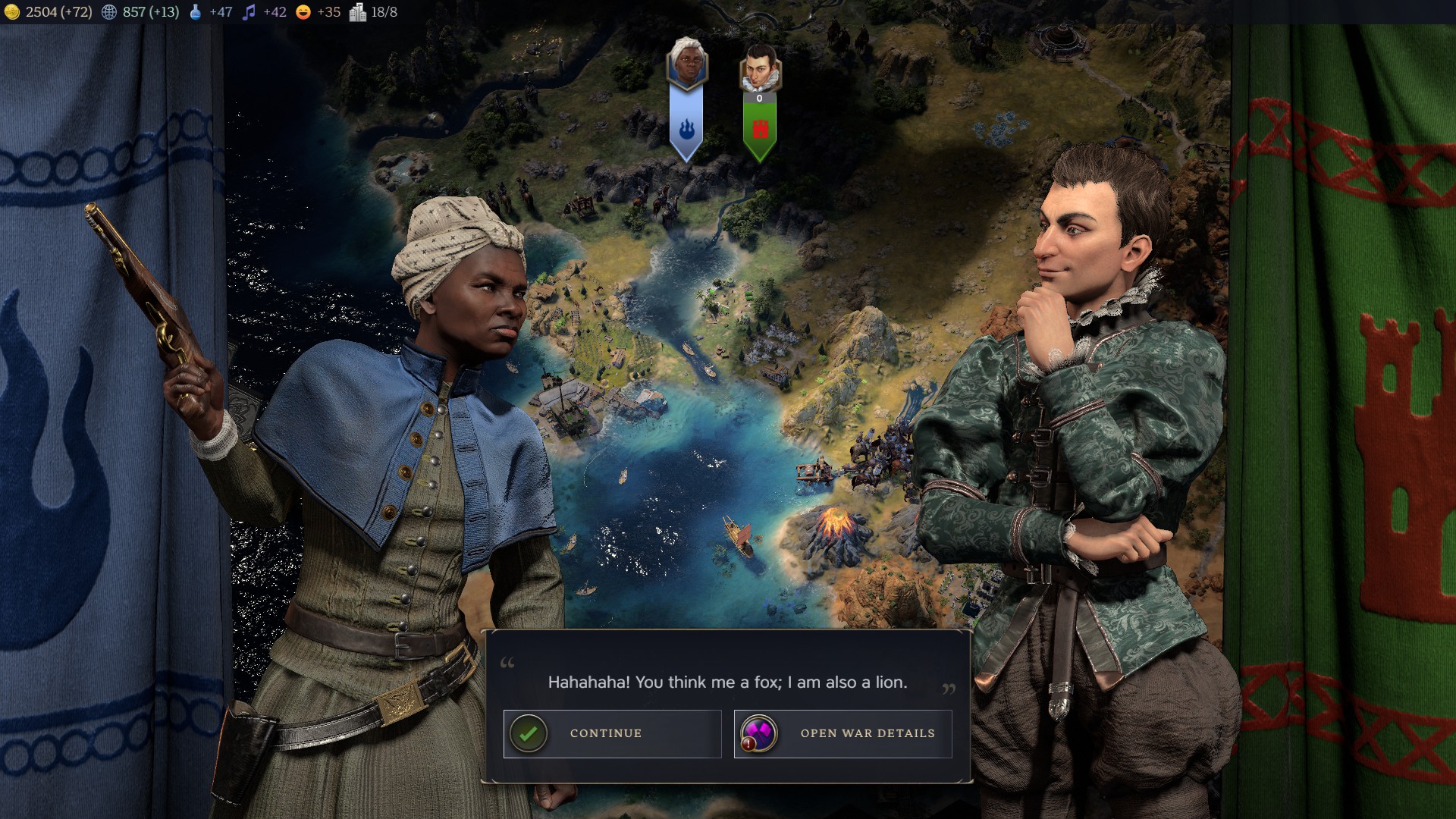TechRadar Verdict
Sid Meier's Civilization 7 successfully evolves the long-running strategy series with a wealth of engaging new systems. Swapping Civs is smartly implemented and the focus on distinct ages prevents matches from dragging on, though the samey Legacy Path system and basic diplomacy mean that it’s not quite the strongest entry yet.
Pros
- +
Visually impressive
- +
Matches have a more consistent pace
- +
Swapping Civs is smartly implemented
- +
Fantastic roster of leaders to choose from at launch
Cons
- -
Legacy Path system ultimately leads to samey games
- -
Diplomacy feels half-baked
Why you can trust TechRadar
After more than fifty hours of Sid Meier's Civilization 7 and the complete annihilation of my sleep routine thanks to one too many late night sessions, I can confidently say that the latest entry in the legendary turn-based strategy franchise from genre masters Firaxis Games is as strategically rich and unapologetically moreish as ever.
Platform reviewed: PC
Available on: PC, PS5, PS4, Xbox Series X|S, Xbox One, Nintendo Switch
Release date: February 11, 2025
I can’t deny that I went in rather sceptical too, as Civilization 7 is comfortably the most radical take on Civilization yet. Where previous installments have relied on just a handful of new mechanics to keep things feeling fresh, Civilization 7 makes several fundamental changes to the series’ core formula that are, by and large, masterfully handled. The decision to separate Leaders and Civs (the many playable historical groups), for example, is a bold one but opens the door to a whole new level of planning.
Employed aptly, swapping between Civs allows you to pivot your strategy on the fly, helping to prevent those painful, protracted losses that were once almost guaranteed to occur if you were unlucky enough to mess up early on. Competitors such as Humankind have experimented with a similar mix-and-match formula in the past but only demonstrated the potential pitfalls of such systems with uneven, poorly balanced matches.
These problems are thankfully nowhere to be found in Civilization 7, though, while it is one of the best PC games, that’s not to say that it's perfect and there aren’t a few areas with room for improvement.
Urban planner
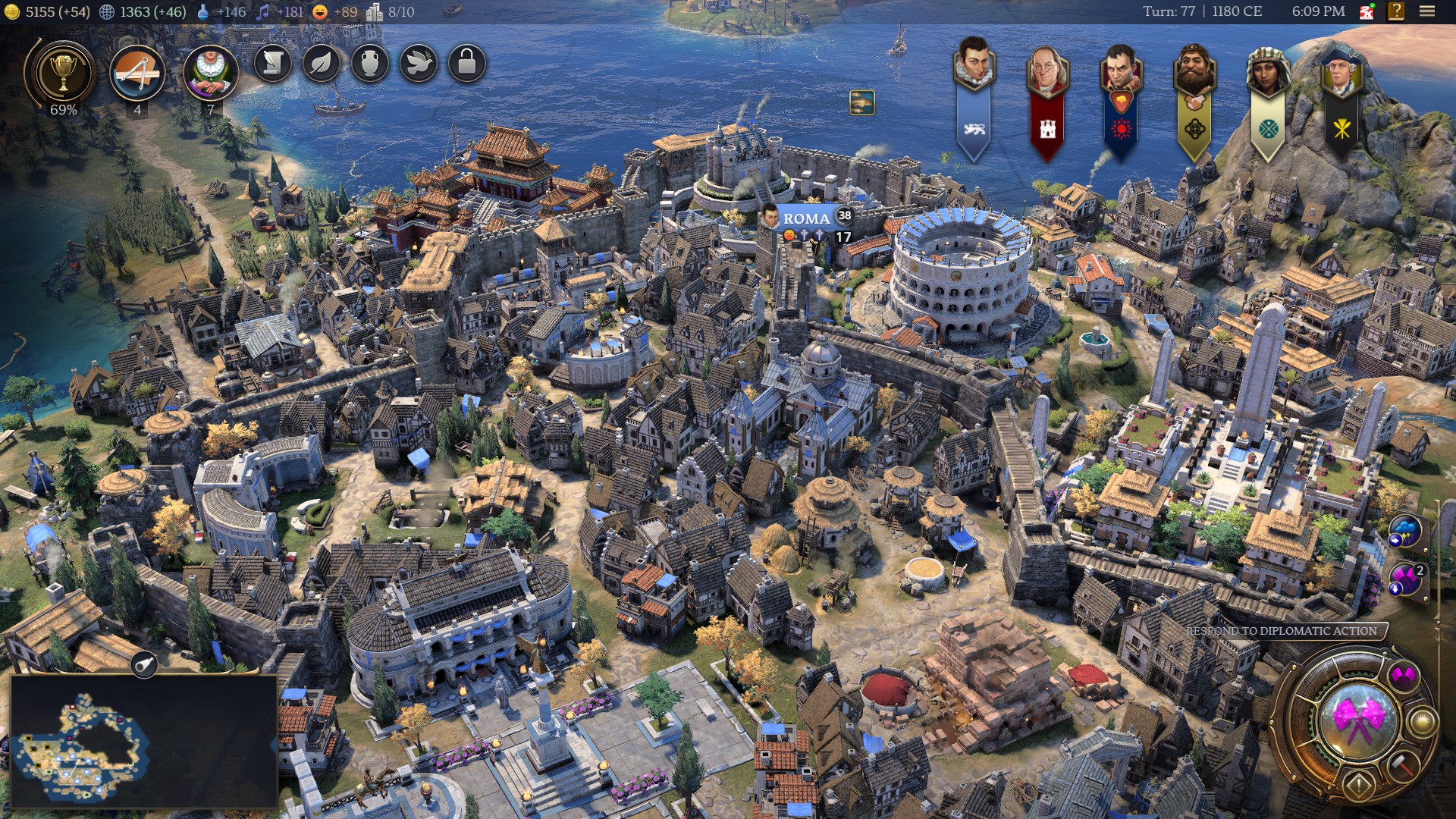
Civilization has always been the archetypal 4X (Explore, Expand, Exploit, Exterminate) strategy game, heavily employing all the elements of the genre’s namesake. You play as a historical leader in a procedurally generated hexagon-tiled map, exploring your surroundings before founding cities and beginning to expand your empire.
Placing buildings within cities provides useful yields, namely Science (which is tied to how fast you can work your way through a technology tree to unlock increasingly modern units or amenities), Culture for acquiring Civics (advancements in ideology with their own unique bonuses), and Production (simply how quickly you can build things). This is on top of more material resources, like Food (for increasing the population and number of tiles that your cities occupy), gold (which allows you to instantly buy buildings or units), and Influence (points you can spend interacting with other leaders).
Learning how to properly exploit the environment is key, as tiles have unique qualities that make them best suited to a certain yield. Paired with a plethora of adjacency bonuses and the new ability to overbuild (replace early buildings with superior versions when they become available), managing your cities is a tricky but thoroughly engaging challenge in and of itself.
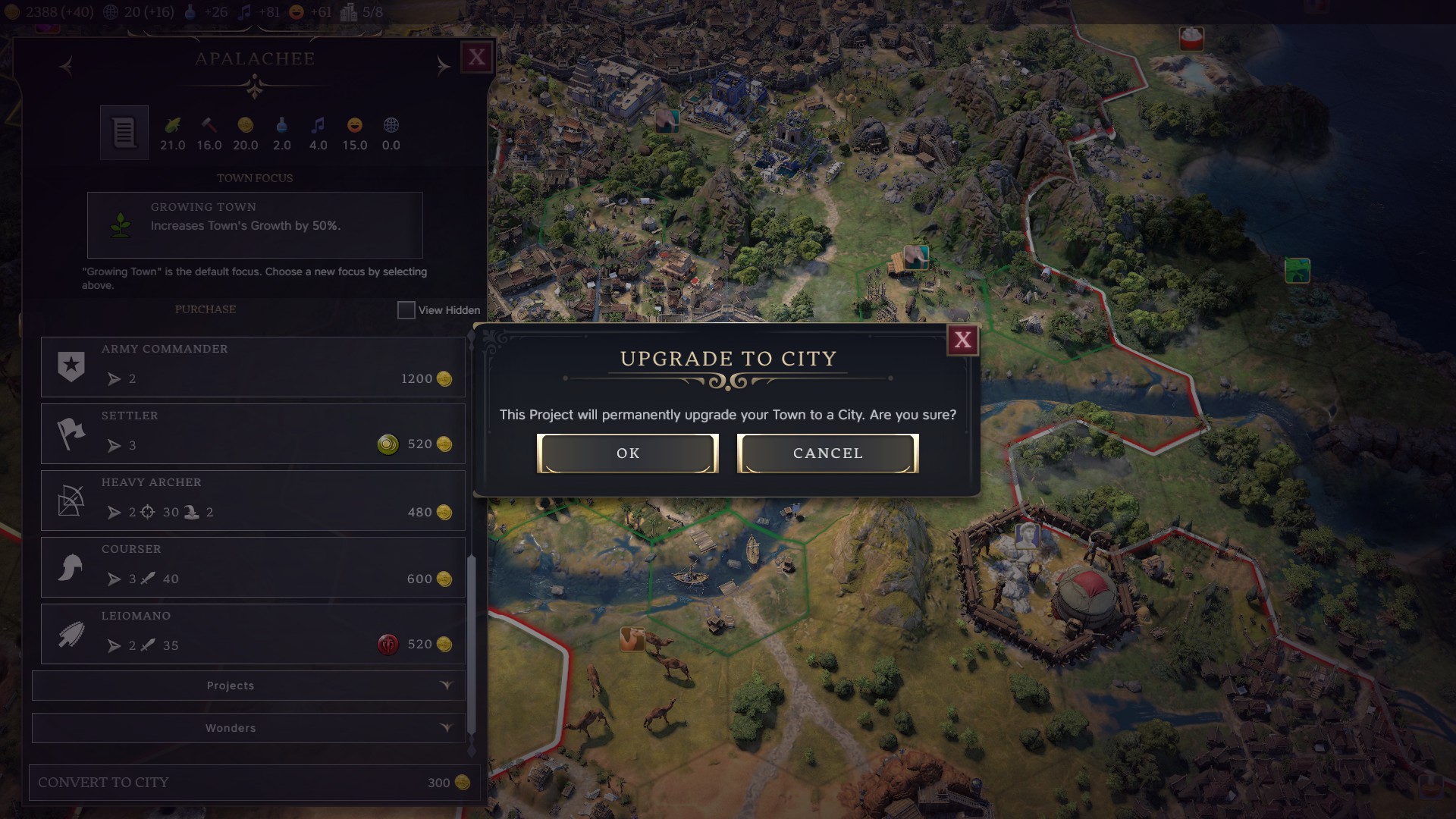
It was something that I always found a tad overwhelming in Civilization 6, but one small tweak makes city management in Civilization 7 that much easier to keep on top of. Now, new settlements are automatically founded as small towns, which are far more limited than full-blown cities and thus don’t require anywhere near the same level of micro-management. You can upgrade towns to cities for a fee, but I was content focusing all my attention on maximizing the output of just a couple of major cities for the majority of my games.
Spending time developing your metropolises is especially rewarding this time around, as Civilization 7 is by far the best looking strategy game I’ve ever played. Each miniature tile is incredibly detailed, allowing you to zoom in and see your chosen buildings as they’re constructed. Whether it’s the animated farm animals, bridges over the flowing rivers, or the wide variety of period-appropriate architectural styles that line the tightly-knit streets, everything looks like a beautiful museum diorama come to life.
Make your mark
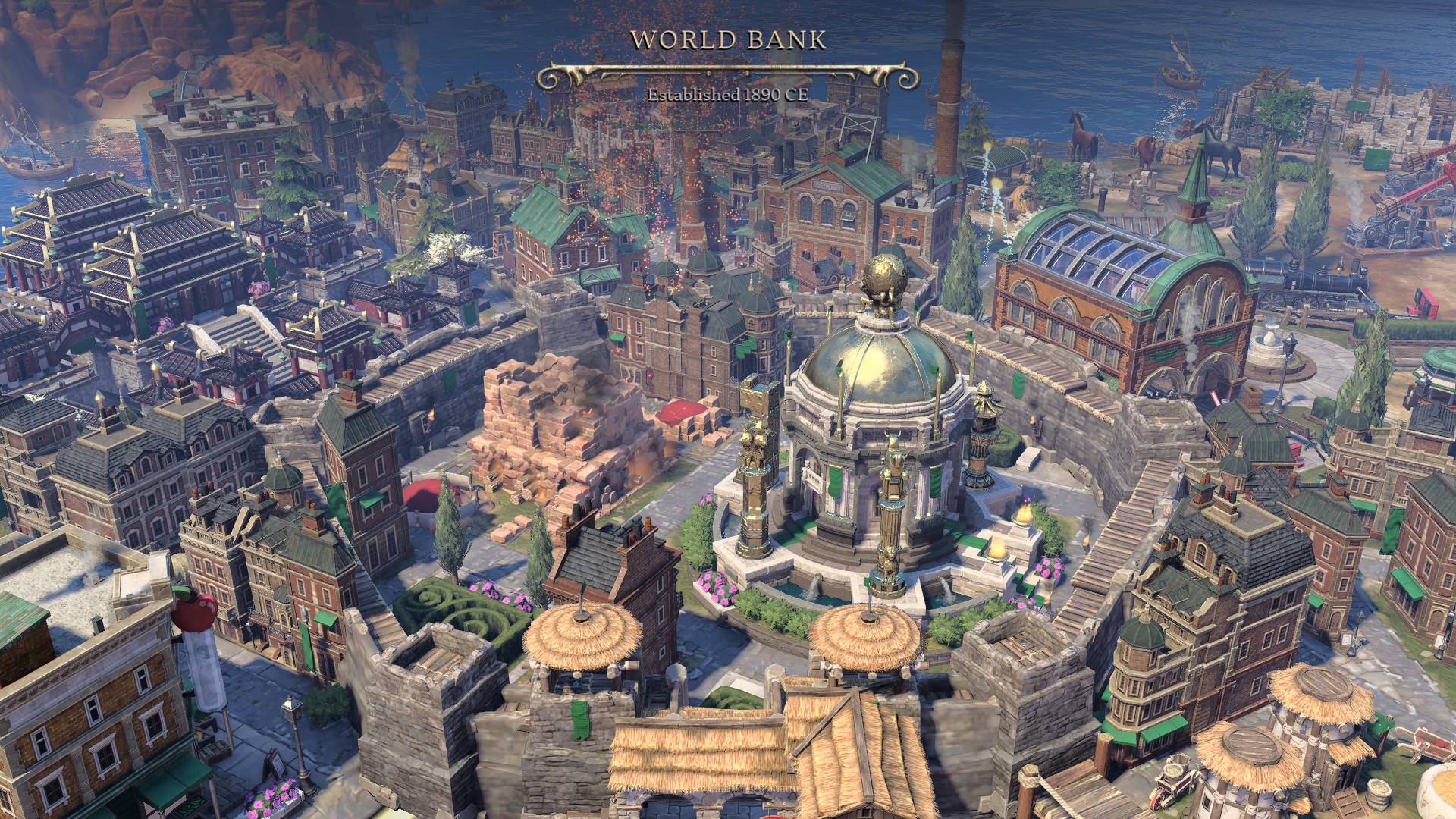
Of course, Civilization 7 is about far more than just managing where your subjects live and each match sees players working towards a range of victory types - with the first to fulfill any one’s conditions crowned the overall winner. The simplest is Domination, where you build up armies and exterminate every other player by capturing all of their territories. Generals, a new unit type that can band together nearby troops for easy transport, are a fantastic addition and eliminate the frustration that was moving large armies in previous games.
Other victory types are now tied to four new legacy paths (Military, Culture, Science, and Economic), which provide a constant set of objectives to pursue. Matches in Civilization 7 are themselves split into three distinct chunks that roughly reflect a key historical period (Antiquity, Exploration, and Modern) and the legacy paths have their own unique goals for each. The Military path, for example, focuses on capturing settlements in Antiquity, dominating the new world in Exploration, and, eventually, successful development of the atomic bomb in Modern.
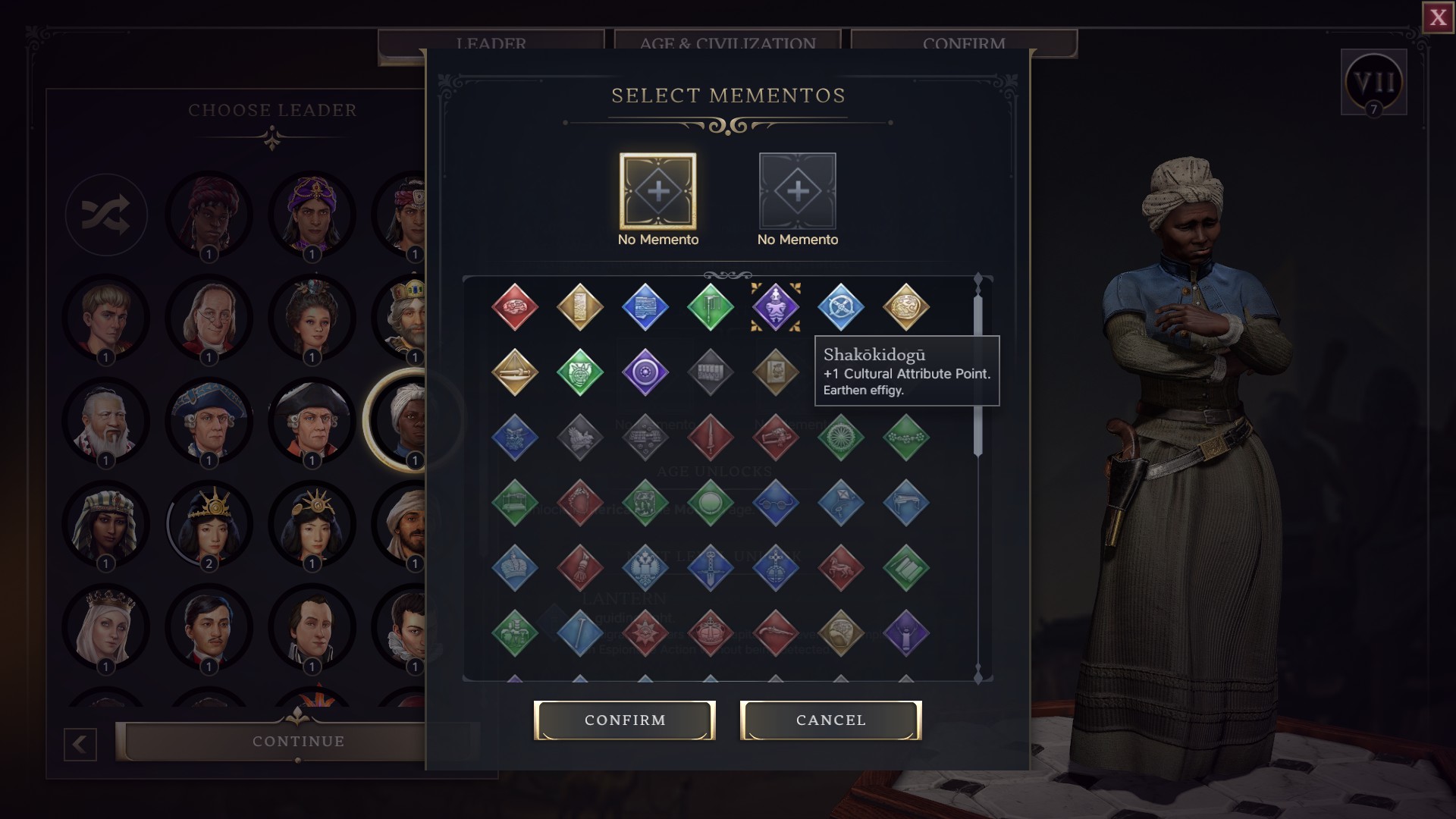
There are multiple new progression systems in Sid Meier's Civilization 7, including one that gives you useful buffs you can take into future games. The most compelling, however, is leader Attributes, which are unlocked as you progress through a match. They help enhance your capabilities in specific areas, letting you finely tweak your leader to support your own playstyle.
Culture, meanwhile, is all about constructing one-of-a-kind World Wonders, founding an influential religion, and finally, a mad rush to dig up historical artifacts from all around the map. They all feel very distinct and successfully completing the objectives of the two initial ages provides useful bonuses for the next like some free population or enhanced versions of buildings. As a result, each age unfolds almost like its own small-scale game of Civilization, with players racing to complete these mini-goals. It lends matches a fantastic sense of pace, finally addressing the tendency for things to drag after the first hundred or so turns.
Still, I did notice that following a legacy path does start to become quite repetitive in time. Each legacy path always has the same goals, so realistically you’re going to end up performing the same actions a lot. By the end of my 50 hours, I felt like I had completely mastered all stages of both the Military and Economic legacy paths and was hesitant to start fresh games pursuing them. After 100 hours, I can imagine really needing some new ways to win - something that I hope will be introduced in the expected barrage of post-launch downloadable content.
Tag team
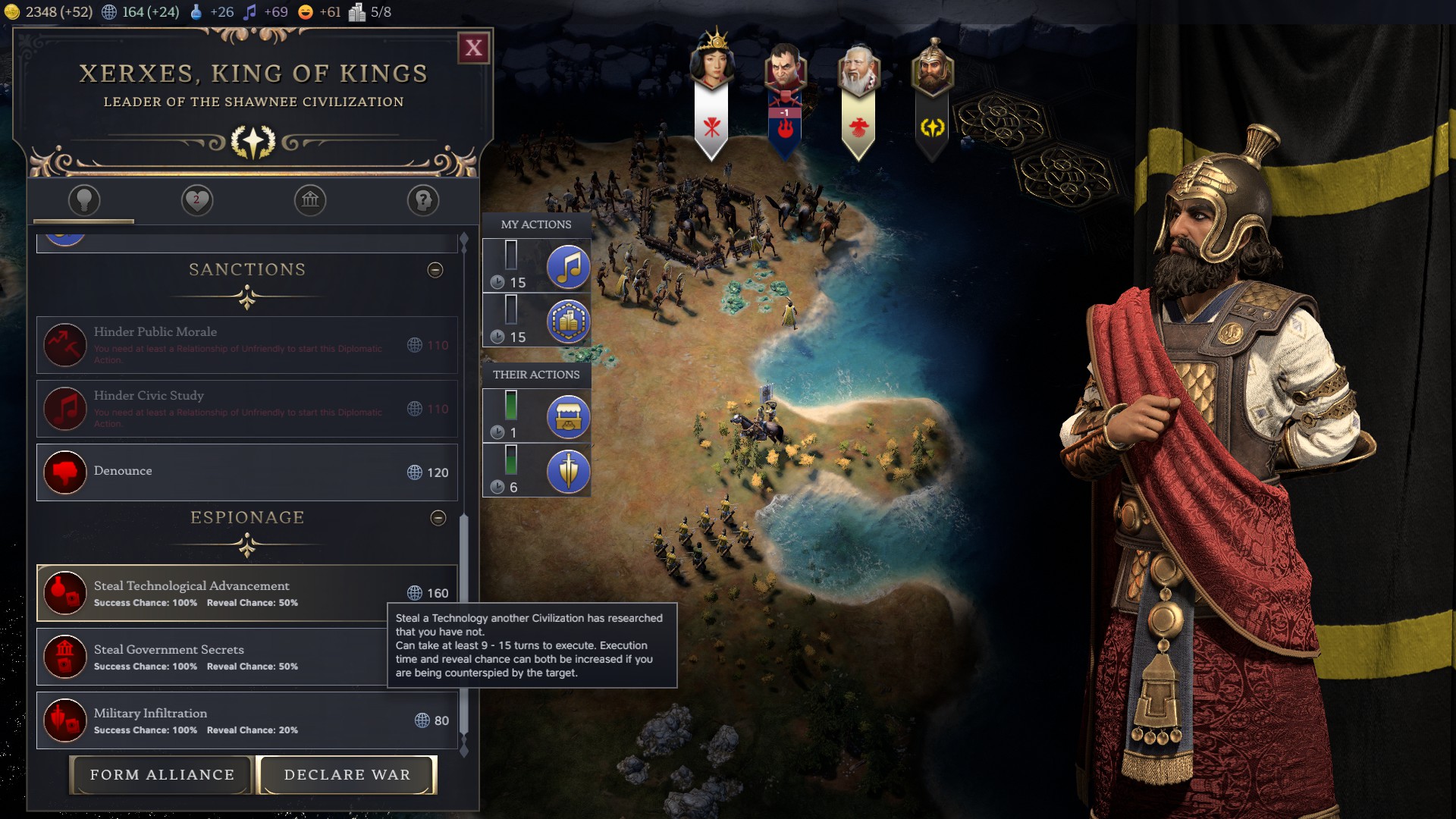
It's not like every match unfolds in entirely the same predictable pattern, however, as the ability to switch your current Civ at the start of each age does add a lot of changeability. This is an absolute highlight and has been implemented impressively well. Each age has its own roster of historical Civs with their own unique buffs, buildings, and units and your choice of leader affects which ones you can pick after your initial selection in Antiquity. Those playing as renowned abolitionist Harriet Tubman, for example, will always be able to access America in the Modern age, which is a clever way to encourage more historically accurate pairings.
You can unlock more Civs by fulfilling certain criteria in each age, too. I played a game where I ended up building a lot of fortifications to protect myself against an aggressive neighbor in Antiquity, which unlocked the option to choose the Normans in the Exploration Age who partly specialize in defense. This is, in a word, brilliant, as it allows you to entirely shift your strategy if something isn’t working out.
If you go into a game intending to pursue an Economic victory and pick one of the corresponding first Civs only to end up wanting to pivot to Culture, you can simply unlock and switch to a more Culture-oriented Civ when you get the chance. It’s easier to pursue multiple victories this way too and means that you can often turn things around if you're not succeeding.
It definitely helps that there is an expansive selection of leaders available at launch, with returning military staples including Napoleon and Augustus joined by unconventional new picks like scheming author Machiavelli and traveled chronicler Ibn Battuta, as well as just over 30 Civs. To top it all off, both leaders and Civs have some really quite unique powers, like Battuta’s Trade Maps Diplomatic Endeavour that lets you spend Influence to see another leader’s explored land or America’s strong resource-grabbing prospector unit.
Code red
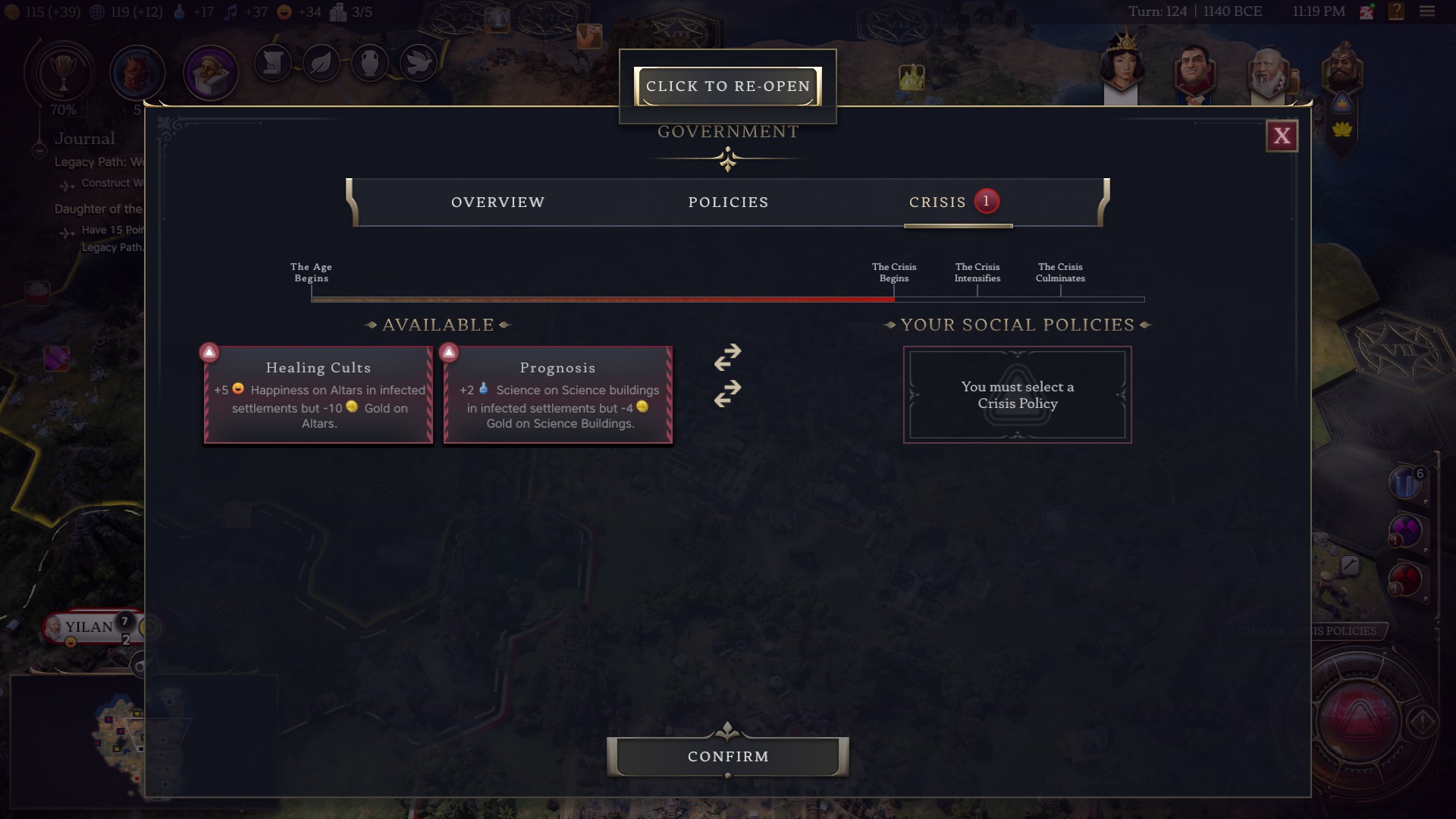
Towards the end of the first two ages, you also have to deal with a crisis, which can range from the appearance of hordes of invading barbarians to deadly plagues that wipe out entire armies in just a few turns.
You combat these by enacting mandatory Crisis Policies, which generally provide some relief in one area while massively hampering your progress in another. Working out exactly which of the policies you’re offered will affect you the least is a welcome puzzle and the looming threat of a crisis ups the ante at a time when you would otherwise be winding down.
In spite of all these bombastic new additions, the one major area where Civilization 7 truly falls short is in its diplomacy system - which is baffling as, in my book, it was almost perfect in Civilization 6. Your interactions with other leaders feel unnecessarily limited, mainly focused on forming simple alliances and open border agreements. You can no longer directly trade gold, which means no bargaining for another leader’s cities or leveraging piles of money to bribe greedy leaders into initiating losing wars with others. It’s a real shame, as those systems opened the door to some seriously amusing scenarios and even helped spice up offline matches against AI.
Otherwise, I have very few reservations about recommending Civilization 7. If you’re a lover of strategy games, you will undoubtedly have a fantastic experience. As an evolution of the series, it’s an admirable success, and, like its predecessor, I’m confident my few complaints will at least be remedied through both free and paid content updates in the months and years to come.
Should I play Sid Meier's Civilization 7?
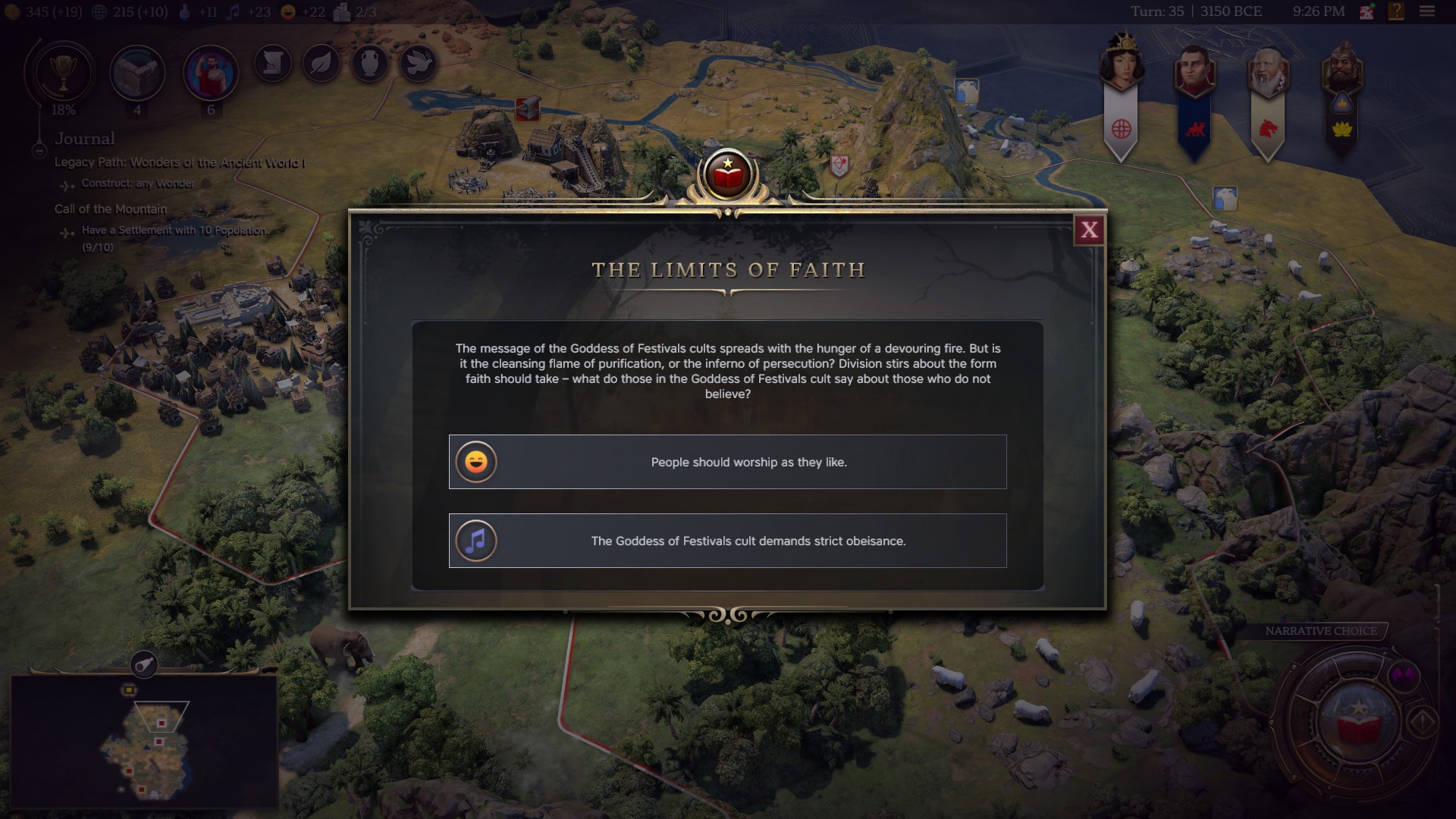
Play it if…
You’re craving a fresh challenge
Sid Meier's Civilization 7 is the freshest feeling Civilization game that I’ve played since Beyond Earth, and I would highly recommend it if you’re a fan of the series seeking a new challenge.
You’re a history lover
Civilization has always been a fantastic franchise for history lovers, and 7 is no exception. With an expansive selection of leaders and Civs, you live out your own historical fantasy and maybe even learn a thing or two about the past in the process.
You want a beautiful strategy game
The art direction of Sid Meier's Civilization 7 is absolutely top-notch, with highly detailed models that looked ripped straight out of a stunning museum diorama.
Don’t play it if…
You intend to play for thousands of hours right away
The legacy path system makes strides when it comes to keeping games well-paced, but it does feel samey after many many hours. If you want to devote your life to this game, I’d recommend waiting for a few new additions rather than diving straight in right out of the gate.
Accessibility
There are a solid number of accessibility options in Sid Meier's Civilization 7 which can be found in a devoted accessibility menu. Keyboard and mouse controls can be remapped on PC, and there is also full support for custom controller layouts.
On top of this, you are able to increase or decrease the font scale, enable colorblind filters, turn on dialogue subtitles, and enable in-game menu or chat narration. There are a range of difficult options to choose from when playing with AI and a comprehensive tutorial system.
How I reviewed Sid Meier's Civilization 7
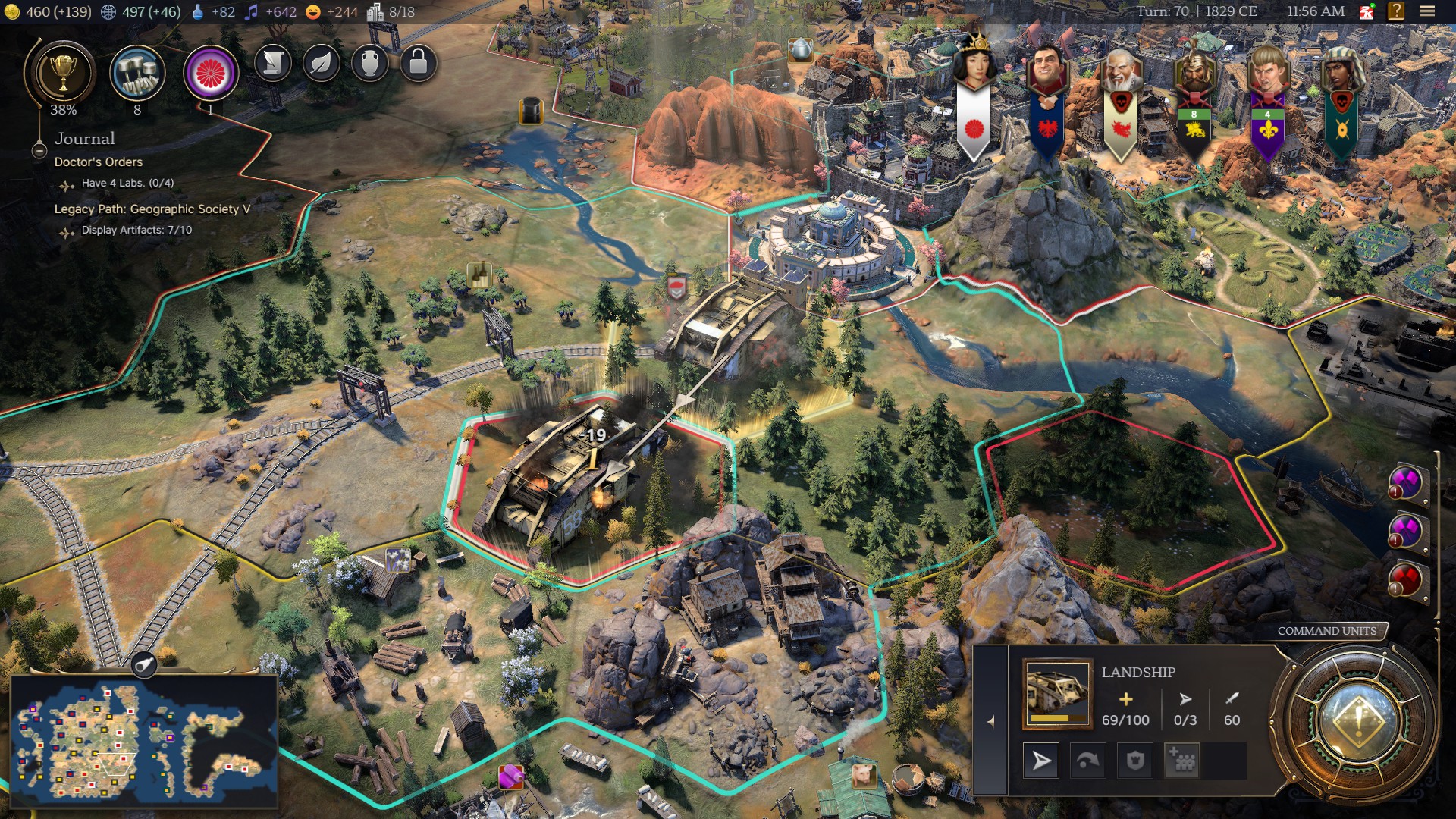
I played Sid Meier's Civilization 7 for almost 60 hours on PC, experimenting with a wide range of leader and Civ combinations. I managed to succeed at each possible victory type, learning their mechanics and following the various legacy paths.
Key specs of my PC build include an Nvidia RTX 3060 GPU, i5-11400F CPU, and 16GB of DDR4 RAM. In terms of peripherals, I relied on an Asus ROG Harpe Ace Aim Lab Edition mouse and an Endgame Gear KB65HE keyboard, plus a Lenovo Q24i-10 Monitor and a SteelSeries Arctis Nova 7 gaming headset for audio.
Throughout my time with the game, I compared my experience to that of not only Civilization games but also a wide range of other 4X strategy titles including Humankind, Ara: History Untold, Endless Legend, and more.
First reviewed January/February 2025

Dash is a technology journalist who covers gaming hardware at TechRadar. Before joining the TechRadar team, he was writing gaming articles for some of the UK's biggest magazines including PLAY, Edge, PC Gamer, and SFX. Now, when he's not getting his greasy little mitts on the newest hardware or gaming gadget, he can be found listening to J-pop or feverishly devouring the latest Nintendo Switch otome.
You must confirm your public display name before commenting
Please logout and then login again, you will then be prompted to enter your display name.
